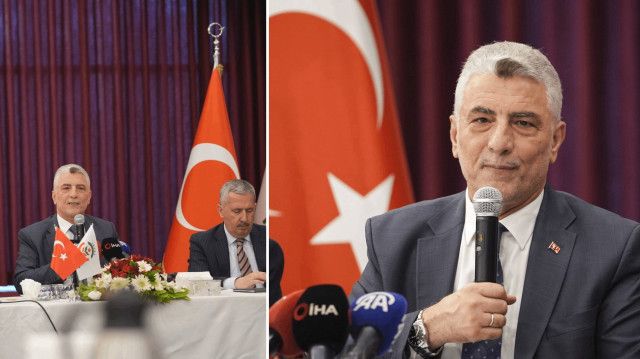Trade Minister Ömer Bolat met with members of the Istanbul Food
Traders’ Market (IGTOT) in Başakşehir, emphasizing the crucial role
of the food sector for Turkiye’s economy and global standing.
In his speech, Minister Bolat underscored the country’s
agricultural potential, saying, “Indeed, thanks be to God, Turkiye
is one of the luckiest and most fruitful countries in the world in
this regard. The lands of Anatolia and Thrace are truly fertile.”
He noted that IGTOT is the largest indoor dry food market in Europe
and, once completed, will comprise 1,121 businesses forming the
heart of trade in this sector. Bolat also highlighted that Turkiye
ranks 10th in the world in agricultural production.
“This is related to country size,” he explained. “We are among
the top three producers in many products. But consider the land
sizes of Russia, Brazil, India, and China—they have a volume
advantage due to their vast territories. Yet, we are number one in
agricultural production in Europe. Last year, Turkiye produced $74
billion in agricultural output. This figure was $24 billion when we
came to power in 2002. Exports were $4.5 billion in 2002 and rose
to $32.5 billion last year.”
Bolat stressed that food is a sector that should never be
neglected. He pointed out that over the past 15–20 years,
particularly since the early 2000s, the sector has faced major
challenges, notably meteorological issues and climate change.
“The seasonal fluctuations are incredible and negatively impact
agricultural production,” he said. “Normal rain turns into
thunderstorms and torrential downpours, wiping out a year’s worth
of production, or drought strikes. Just when crops are about to be
harvested, they rot and wilt due to excessive sun and extreme heat.
This disrupts the balance between production and consumption.
Consumption remains the same. Eighty-six million citizens expect
reasonable prices, and consumers want affordable products.
Producers also need to meet cost requirements and earn a fair
profit, at least equal to inflation, because the industry must make
a profit to sustain itself. This year’s rainfall was low, and
temperatures were higher than last year. We were predicting 2024
would be the hottest summer, but this year exceeded that
forecast.”
Bolat elaborated on specific climate events: “Things were going
well in the spring with good rains, but we first experienced a
harsh February at the end of the month—a very cold winter. There
was an agricultural frost in the Mediterranean. Then, on the nights
of April 9, 10, and 11, temperatures dropped to -17°C in nearly all
60 provinces. This agricultural frost froze and dried many summer
fruits while they were in full bloom, leading to decreased summer
fruit production in some regions. We are managing these processes
through various market control regulations. Expectations can vary
widely here; one could fully open the import structure for very
cheap food products. But Turkish farmers would suffer greatly,
agricultural production would not recover, and there would be
significant foreign currency losses.”
Bolat emphasized that the agricultural and food sectors are
among the most strategic sectors globally, with countries actively
protecting them. “During the pandemic, countries prevented each
other from selling agricultural products and cleaning agents,
imposing export taxes. We do the same when necessary. When
production is low, we record and limit exports; when production is
high, we encourage exports. If prices dip, farmers become resentful
and may reduce production the following year, shifting to other
sectors.”
The minister highlighted ongoing cooperation between the
Ministry of Trade and the Ministry of Agriculture and Forestry to
balance production and consumption. “Those who deliver agricultural
products to consumers include wholesalers, producer cooperatives,
producer unions, wholesale markets, and supermarkets,” he said.
Bolat also detailed government support, stating, “Over 22 years,
493 billion lira—half a trillion lira—has been provided in
production support to farmers. This figure excludes additional
support for structural production reforms and rural
development.”
He further noted that businesses and sites in the food sector
have been modernized. “We would have been talking about more
reasonable prices for summer fruits if there hadn’t been the
agricultural frost last April. For some fruits, prices remained
normal; for others, they remained high. The downward trend in
inflation will continue,” Bolat concluded.
